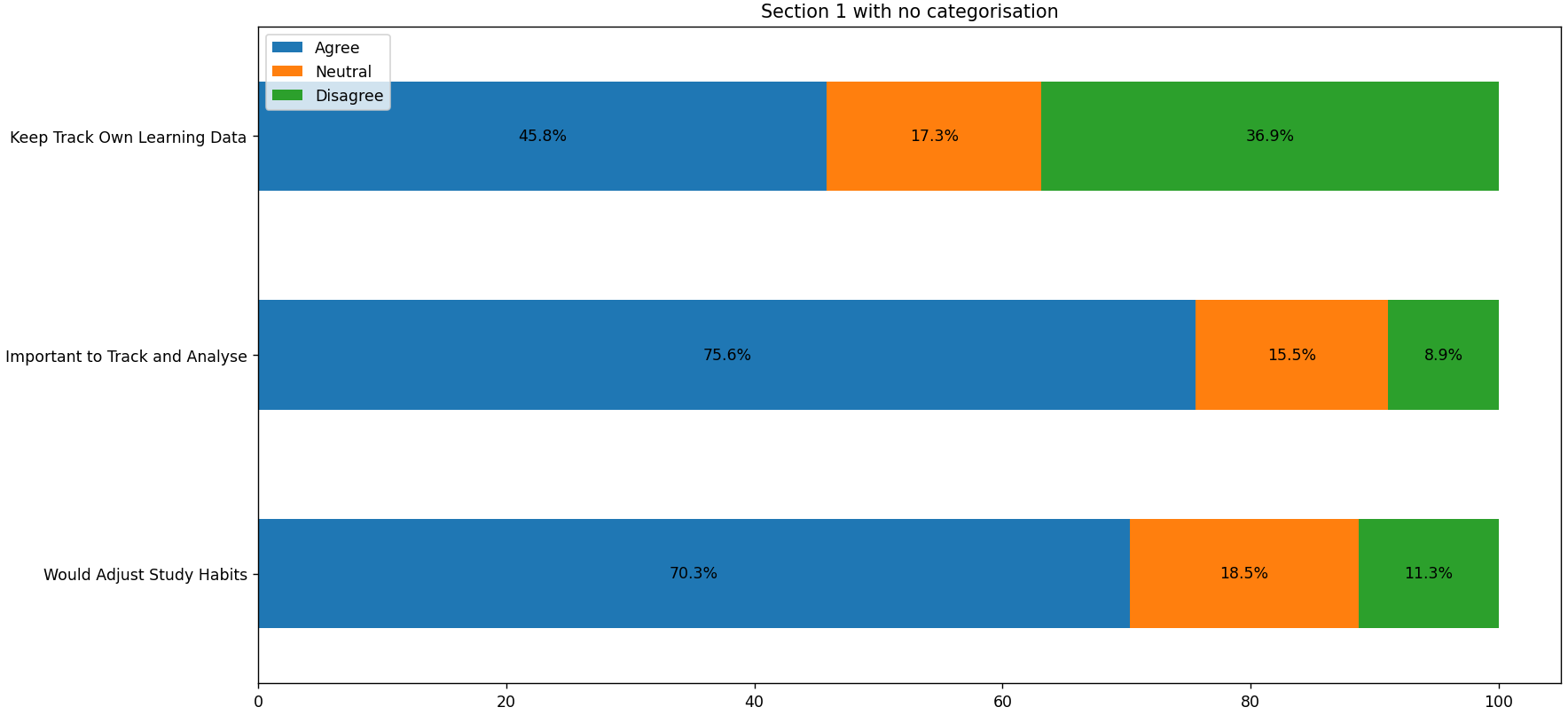NTU-Imperial Education Fund: Learning analytics and data literacy
Students and Learning Analytics: A glimpse into students’ perspective towards university’s handling of learning data
Responding to an open call for student researchers to support the university’s learning analytics initiatives in September 2023 by the Centre for the Applications of Teaching & Learning Analytics for Students (ATLAS) in Nanyang Technological University (NTU); four of us from varying disciplines across the humanities and computer science fields came together with the desire to improve the learning experiences at the university with a particular focus on emerging Artificial Intelligence (AI) technology.
Described as a “for students, by students” research project, the student centric nature of the investigation allowed for a more intimate and candid discussion with regards to students’ feedback and concerns with how their data is being utilized by the university. There is a need to strike a balance between student privacy as well as data utility, and this requires more than technological solutions (Zhan et al., 2024).
We note existing concerns about student data privacy (Prinsloo, Slade, & Khalil, 2022) and with differences highlighted across national and cultural contexts (Viberg et al., 2024). Together with our like-minded friends from Imperial College London, we embarked on a collaborative journey of designing surveys, questionnaires, and interview questions with the goal of gathering the wider students’ insights and considerations for how learning analytics would be best deployed by the university.
With guidance from research mentors notably, Dr Lim Fun Siong (NTU) and Associate Professor Camille Howson (Imperial College London), we worked hard on surveying and interviewing the larger student population and then working on analyzing insights or trends from the results. Our efforts culminated into a mini-joint conference in December 2023 in which we shared the results from the first part of our study which focused on the general sentiments of university students towards learning analytics through an online mass survey.

There were a few interesting insights discovered, such as how there were a much larger number of students who believed in the benefits of tracking one’s learning data yet only less than 50% of student respondents kept track of their own learning data. Most students also feel that there is a need for informed consent and data literacy

Figure 1. Asian University's Student Responses on Personal Use of Data (n=167)
The second part of the joint study focused on gathering a deeper understanding of the survey findings. A university-wide call was put out to students inviting them to participate in a short 1-on-1 interview. The pool of interested applicants were then carefully chosen, considering mainly their type of major and their year of study to ensure a diverse pool of the students’ population had their voice in the study.
The interviews allowed us to seek deeper and more detailed responses to understand the attitudes of students towards learning analytics and learning data collection in universities. In addition, nuances lost in quantitative surveys were able to be collected through interview settings – for example, though many students had indicated concern over the collection of their data, we learnt that while some students are more concerned about the anonymity of their data, others are more concerned about the vulnerability of the school system to external attacks. This difference in concerns builds upon the knowledge we gained in our earlier surveys.
The interviews across both NTU and Imperial also offered a chance to consider the differences in attitudes held towards learning analytics in an Asian context versus a European one. One interesting difference was that while Imperial students were inclined to learning analytics being used to improve lecture delivery, NTU students preferred it to be used for individual learning optimization.

Concluding Reflection
This research project allowed us as students to take an active role in the development of learning analytics policies and guidelines in schools and gave a platform for students’ own voices to be heard. In addition, as student researchers, we learned critical research skills and used our diverse backgrounds and skills. Given the variety of backgrounds we came from, each student offered different perspectives and skills that contributed to submitting a research paper.
Working with students from another university, Imperial College London, provided us with the opportunity for the exchange of ideas and a deeper understanding of the attitude students hold towards learning analytics across political and cultural borders.
The research results and recommendations from the students suggest that while learning analytics remains positively viewed by most students, the collection of data that is required for it is often viewed poorly, suggesting both the need for education on data privacy in learning environments as well as a more transparent and simple-to-understand policy towards learning analytics.
References
- Prinsloo, P., Slade, S., & Khalil, M. (2022). The answer is (not only) technological: Considering student data privacy in learning analytics. British Journal of Educational Technology, 53(4), 876–893.
- Viberg, O., Kizilcec, R. F., Jivet, I., Mone ́s, A. M., Oh, A., Mutimukwe, C., ... Scheffel, M. (2024). Cultural differences in students’ privacy concerns in learning analytics across germany, south korea, spain, sweden, and the united states. Computers in human behavior reports, 100416.
- Zhan, C., Joksimovi, S., Ladjal, D., Rakotoarivelo, T., Marshall, R., Pardo, A., et al. (2024). Preserving both privacy and utility in learning analytics. IEEE Transactions on Learning Technologies.
Akshay Anil, Linguistic and Multilingual Studies (Nanyang Technological University)
Dominic Lai Meng Xuan, Data Science and Artificial Intelligence (Nanyang Technological University)
Reyan Thong, Data Science and Artificial Intelligence (Nanyang Technological University)
Nicholas Yeo Yong Han, Linguistic and Multilingual Studies (Nanyang Technological University)
